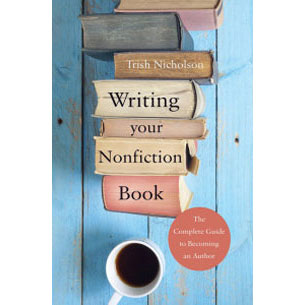Writing Your Nonfiction Book: the complete guide to becoming an author
 Ever wanted to share your passion, tell your story or pass on a skill? Here is your chance. Memoir, travelogue, history, biography, how-to, self-help or textbook, Writing Your Nonfiction Book guides you through the whole process from idea to published book and how to market it.
Ever wanted to share your passion, tell your story or pass on a skill? Here is your chance. Memoir, travelogue, history, biography, how-to, self-help or textbook, Writing Your Nonfiction Book guides you through the whole process from idea to published book and how to market it.
The advice is relevant to both print and digital publishing whether by traditional routes or self-publishing, and includes tips on each specific sub-genre.
Though suitable for first-time authors, there is much in this book for experienced writers of non-fiction, and even fiction.
Written in a friendly, accessible style, the book has a global scope and lists resources and useful websites for various countries. Writing Your Nonfiction Book has been adopted as a standard text by international writing courses.
What reviewers say about Writing Your Nonfiction Book:
‘Essential how-to manual for writers of every sort.’ Words with JAM ezine
‘Don’t write before you read this.’ Writer’s Block website
‘A superb collection of everything one needs to know about writing – from defining your subject through to marketing the finished product.’ Self Publishing Magazine
Read the complete review from Self Publishing Magazine:
‘Having reviewed many books on how to write/edit/market your book they all have some good tips, but this one has the lot! In fact one could say it’s the ‘real deal.’ Not having read author Trish Nicholson’s other published work, I can’t speak for her prowess as an author, but I can say that Writing Your Nonfiction Book is a superb collection of everything one needs to know about writing – from defining your subject through to marketing the finished product.
Aimed at nonfiction writers, the content applies equally to fiction (for example writing style, narrators and points of view, plotting the action, writing people as characters).
The contents pages are impressive – catchy and informative chapter titles and key points that outline exactly what one can expect to find. As with any good nonfiction book, each chapter ends with ‘What to do now.’ Each chapter has plenty of examples (many from famous authors) to illustrate key points and the book is also extremely well edited. I was able to pick up really useful points – plus I actually learnt something.
I was particularly impressed with the sections on grammar such as sentence construction, use of tense and so on. I actually thought Nicholson had missed a point that had always perplexed me – the use of a dash (–) in a sentence, but no, there it was a few pages later.
I think ‘must read’ is too hackneyed a phrase to describe this book, but if you’re an author, I strongly recommend you go out and buy it.’
Where to buy Writing Your Nonfiction Book:
Amazon UK
Amazon US
Book Depository (print only/free freight)
In the UK Buy direct from the publisher using the discount code (print only).
or download the ebook from your favourite online bookstore worldwide.
And you can order the paperback from your favourite local bookshop. Trade orders can be made through the following distributors: Orca Book Services, Gardners, Bertrams, or via Nielsen’s teleordering.
And here are 10 Good Reasons to Write Your Non-fiction Book.
1. Share with others your passion for a particular subject: look at the rack upon rack of special interest and hobby magazines in newsagents – people who buy them are your potential readers. Pets, sport, craft, food, fitness, gardening – the field is wide open.
2. Compile a personal account for family, friends and posterity: memories and the wisdom of our elders are precious, and too easily lost, leaving young people feeling rootless. Don’t wait until, sadly, it’s ‘too late’ to ask Grandpa.
3. Correct the record of events or issues with new facts or insights: misinformation, bias, or simply lack of knowledge is everywhere; if you can access new evidence, or offer fresh perspectives, you could set the picture straight.
4. Enable others to benefit from your special experience: emigrating, gardening, travelling, applying specific skills, coping with personal crises – whatever your adventures or personal challenges, sharing the know-how may help and encourage readers.
5. Disseminate a message you feel is of wide public interest: topics like health, the environment, and social/economic policies, are of concern to large numbers of people. You could provide fresh insights.
6. Increase your professional credibility in a subject to further your career: as an author, you become an authority, whether on cooking, history, art, retailing, photography or any other branch of learning.
7. Apply the book as a promotional and marketing tool to boost your business: there are many ways of increasing the credibility and visibility of your company through authoring a book relevant to your sector, product, or skill set.
8. Support and publicise a charitable cause: a memoir, documentary or set of case studies are all possible ways of sharpening the profile, raising funds, or increasing volunteer participation, e.g. for disability groups, or the environment.
9. Generate income: the competition is tough, but it is easier to get published in nonfiction than fiction, or you can publish your book yourself.
10. Enjoy the challenge and satisfaction of doing so: to write a well-crafted book is enormously rewarding; it leaves a heritage for others, and it will keep you out of mischief for a considerable time.
Happy and successful writing!
